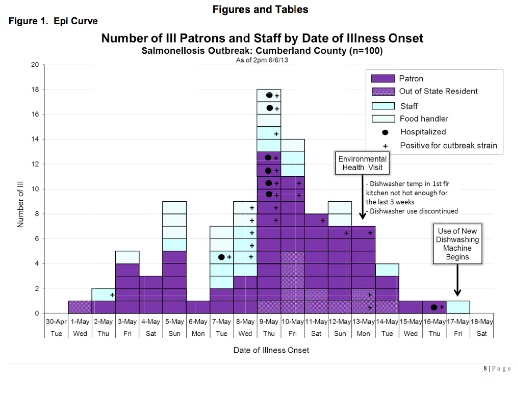Public health officials at the North Carolina Department of Health and Human Services and the Cumberland County Department of Public Health have released the final report on the Salmonella Typhimurium outbreak at the Holiday Inn Bordeaux in Fayetteville, North Carolina. The outbreak was first reported in May 2013.
To investigate this outbreak, officials interviewed sick people, took environmental samples for testing, and collected stool specimens. A total of 100 cases were identified during the outbreak; 25 were confirmed by lab analysis and 75 were probable. All isolates available for PFGE analysis had identical patterns. Illness onset dates ranged from May 1 to May 17, 2013. The age range of patients was from 17 to 81 years. Eight people were hospitalized as a result of their illness.

At the Holiday Inn Bordeaux, inspectors found problems. There were multiple opportunities for Salmonella contamination, including improper water temperatures, absence of hand washing supplies, bare hand contact with ready-to-eat foods, temperature violations, and a dishwasher that was not operating effectively. A statistically significant increased risk of illness occurred among hotel staff who ate or drank at the All American Grill, compared with staff who did not eat or drink at that restaurant. There were no significant associations between ill persons and Cafe Bordeaux.
Officials have concluded that the All American Grill was the source of the outbreak, even though a specific food item couldn’t be directly linked to the outbreak. Officials believe cross-contamination of food products or surfaces was the vehicle in the outbreak. Seven food service employees were working while ill, even though they should not have returned to work until they are asymptomatic for at least 24 hours, according to the North Carolina Food Code Manual. The report stated that “sick leave policies may be a barrier [to this practice] if workers are not compensated while being excluded from work due to illness.”
In addition, the improperly functioning dishwasher may have played a part in this outbreak. It did not raise the surface temperature of dishes to 160 degrees, a temperature that is necessary to kill pathogenic bacteria. Improper hand washing without hot water, soap, and hand drying material also likely played a part in this incident.




